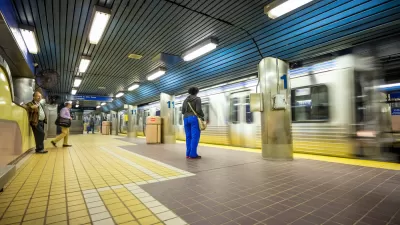Forever plagued with issues, from lack of funding to a lack of political support, Philadelphia's SEPTA mass-transit network is (again) on the verge of collapse.
Daniel Denvir of the Philadelpia City Paper expertly paints the picture behind the colorful past of "[t]he underrated, underfunded, enormous and, yes, aromatic Southeastern Pennsylvania Transportation Authority, known with strained affection as SEPTA" and the social and political concerns placing strains, some would call fatal, on the popularly-used (though not popularly-adored) system.
The most pressing issue at hand is funding constraints, mainly related to political infighting. "Republican politics in Pennsylvania are no longer determined by the commonwealth's challenges," writes Denvir. Pennsylvania Republicans, often ear-to-mouth with the Tea Party, and with Pennsylvania Governor Tom Corbett and Congress offering little support, have left SEPTA largely to fend for itself, despite increasing financial problems. The system's capital funds alone, according to SEPTA chief engineer Jeff Knueppel, lacks the "$600 million" which will be needed to keep the system safe and operation in its current state, let alone any funds for new purchases or expansions of service, despite the growing ridership. Capital investment "now stands near a woefully inadequate $300 million."
Investments in public transportation could mean "jobs created, economy stimulated and people's lives made remarkably easier," says Denvir, but, "[w]ithout the political will from local, state and national elected officials, SEPTA won't ever get back on track.
FULL STORY: Why SEPTA is Heading for a Crash

Planetizen Federal Action Tracker
A weekly monitor of how Trump’s orders and actions are impacting planners and planning in America.

Map: Where Senate Republicans Want to Sell Your Public Lands
For public land advocates, the Senate Republicans’ proposal to sell millions of acres of public land in the West is “the biggest fight of their careers.”

Restaurant Patios Were a Pandemic Win — Why Were They so Hard to Keep?
Social distancing requirements and changes in travel patterns prompted cities to pilot new uses for street and sidewalk space. Then it got complicated.

Platform Pilsner: Vancouver Transit Agency Releases... a Beer?
TransLink will receive a portion of every sale of the four-pack.

Toronto Weighs Cheaper Transit, Parking Hikes for Major Events
Special event rates would take effect during large festivals, sports games and concerts to ‘discourage driving, manage congestion and free up space for transit.”

Berlin to Consider Car-Free Zone Larger Than Manhattan
The area bound by the 22-mile Ringbahn would still allow 12 uses of a private automobile per year per person, and several other exemptions.
Urban Design for Planners 1: Software Tools
This six-course series explores essential urban design concepts using open source software and equips planners with the tools they need to participate fully in the urban design process.
Planning for Universal Design
Learn the tools for implementing Universal Design in planning regulations.
Heyer Gruel & Associates PA
JM Goldson LLC
Custer County Colorado
City of Camden Redevelopment Agency
City of Astoria
Transportation Research & Education Center (TREC) at Portland State University
Camden Redevelopment Agency
City of Claremont
Municipality of Princeton (NJ)




























